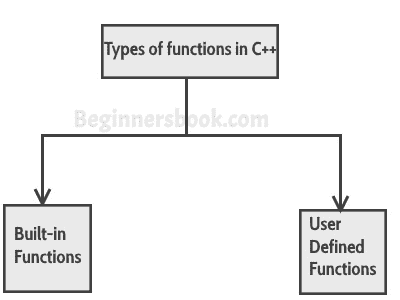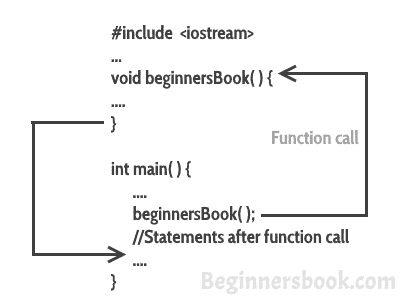函数是用于执行特定任务的代码块,例如,假设您正在编写一个大型 C++ 程序,并且在该程序中,您希望多次执行特定任务,例如显示从 1 到 10 的值,为了做到这一点,你必须编写几行代码,每次显示值时都需要重复这些行。另一种方法是在函数内写入这些行,并在每次要显示值时调用该函数。这将使您的代码简单,可读和可重用。
函数的语法
return_type function_name (parameter_list){//C++ Statements}
让我们举一个简单的例子来理解这个概念。
一个简单的函数示例
#include <iostream>using namespace std;/* This function adds two integer values* and returns the result*/intsum(int num1, int num2){int num3 = num1+num2; return num3;}int main(){//Calling the functioncout<<sum(1,99);return 0;}
输出:
100
同样的程序可以这样写:好吧,我正在编写这个程序,让你理解一个关于函数的重要术语,即函数声明。让我们先看看程序,然后在最后讨论函数声明,定义和函数调用。
#include <iostream>using namespace std;//Function declarationint sum(int,int);//Main functionint main(){//Calling the functioncout<<sum(1,99);return 0;}/* Function is defined after the main method*/int sum(int num1, int num2){int num3 = num1+num2;return num3;}
函数声明:你已经看到我用两种方式编写了相同的程序,在第一个程序中我没有任何函数声明,在第二个程序中我在程序开头有函数声明。问题是,当您在程序中的main()函数之前定义函数时,您不需要执行函数声明,但如果您在main()函数之后编写函数,就像我们在第二个程序中那样,那么您需要先声明函数,否则会出现编译错误。
函数声明的语法:
return_type function_name(parameter_list);
注意:在提供parameter_list时,您可以避免参数名称,就像我在上面的示例中所做的那样。我给了int sum(int,int);而不是int sum(int num1,int num2);。
函数定义:编写函数的全部称为定义函数。
函数定义语法:
return_type function_name(parameter_list) {//Statements inside function}
调用函数:我们可以像这样调用函数:
function_name(parameters);
现在我们已经理解了函数的工作原理,让我们看看 C++ 中的函数类型。
函数类型
我们在 C++中有两种类型的函数:

1)内置函数
2)用户定义的函数
1)内置函数
内置函数也称为库函数。我们不需要声明和定义这些函数,因为它们已经在 C++ 库中编写,例如iostream,cmath等。我们可以在需要时直接调用它们。
示例:C++ 内置函数示例
这里我们使用内置函数pow(x, y),它是x的y次幂。此函数在cmath头文件中声明,因此我们使用#include指令将该文件包含在我们的程序中。
#include <iostream>#include <cmath>using namespace std;int main(){/* Calling the built-in function* pow(x, y) which is x to the power y* We are directly calling this function*/cout<<pow(2,5);return 0;}
输出:
32
2)用户定义的函数

我们已经看过用户定义的函数,我们在本教程开头给出的示例是用户定义函数的示例。我们在程序中声明和编写的函数是用户定义的函数。让我们看另一个用户定义函数的例子。
用户定义的函数
#include <iostream>#include <cmath>using namespace std;//Declaring the function sumint sum(int,int);int main(){int x, y;cout<<"enter first number: ";cin>> x;cout<<"enter second number: ";cin>>y;cout<<"Sum of these two :"<<sum(x,y);return 0;}//Defining the function sumint sum(int a, int b) {int c = a+b;return c;}
输出:
enter first number: 22enter second number: 19Sum of these two :41

